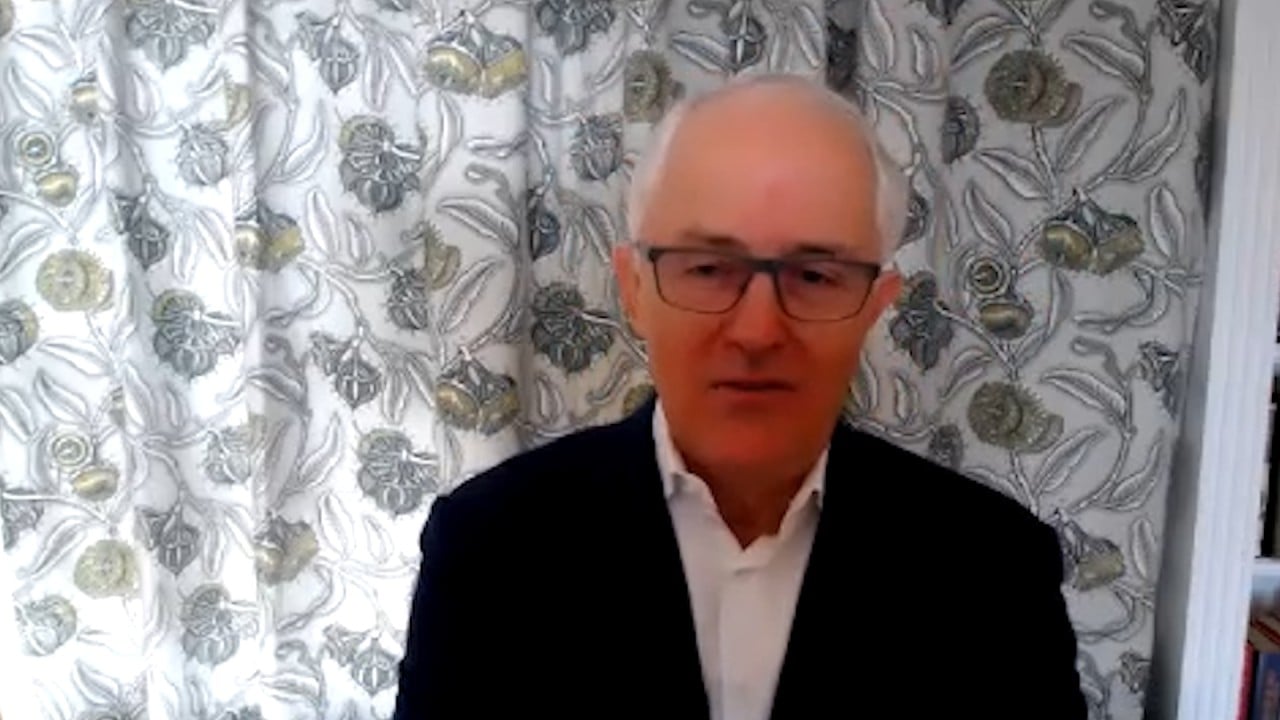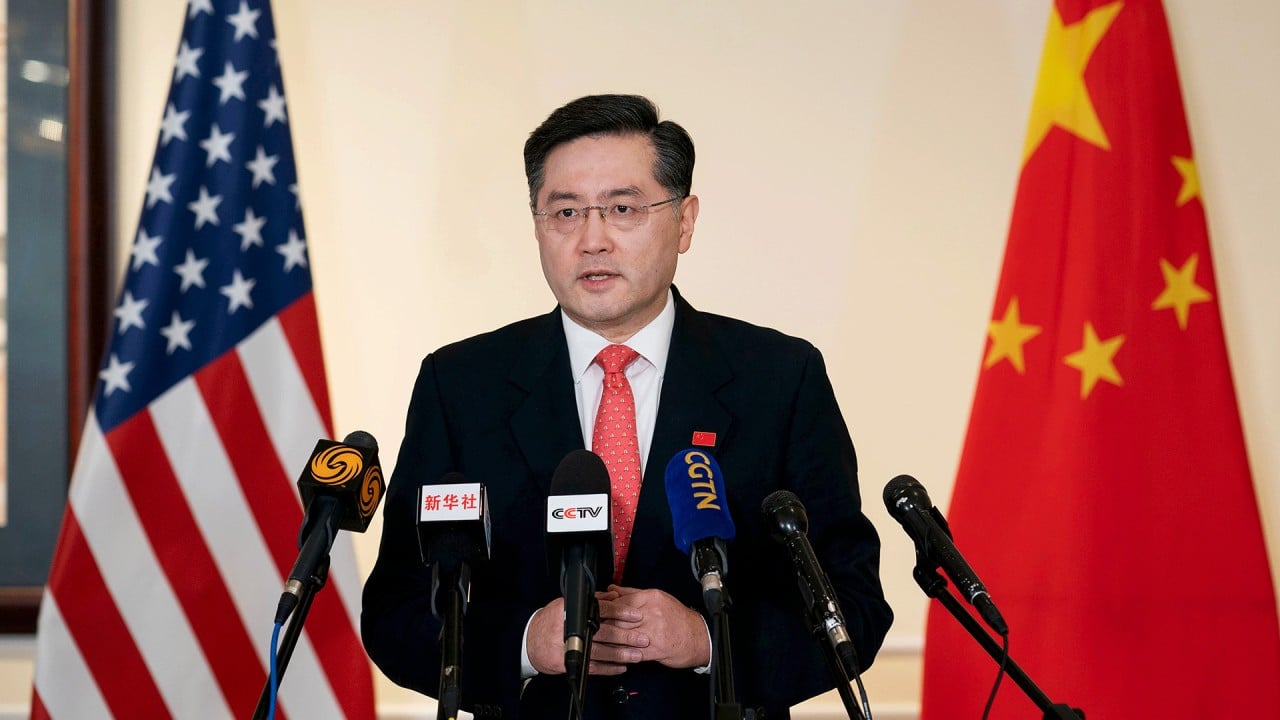
Fire and fury: the young Chinese hawks chosen to take on Washington
- Xie Feng was sent in to do the tough talking to the US’ Wendy Sherman in Tianjin last month
- But just how much can he and new Chinese envoy Qin Gang achieve in an era of growing belligerence?
China and the US have been at loggerheads on almost all fronts, but with tensions continuing into the Joe Biden presidency, where is the relationship heading? After US deputy secretary of state Wendy Sherman’s visit to Tianjin last week, and the Washington debut of China’s new envoy to the US Qin Gang, this series aims to check the temperature of bilateral relations. Here, Shi Jiangtao and Catherine Wong look at how a new generation of Chinese diplomats will handle Beijing’s relations with Washington.
Is China working a ‘long game’ to replace US as No 1 power?
“The hope may be that by demonising China, the US could somehow ... blame China for its own structural problems,” state media quoted him as saying.
With both Beijing and Washington struggling to come up with a winning strategy in the post-engagement era, Xie and Qin are expected to work together to perform frontline roles in managing China’s increasingly belligerent ties with the US in the years to come.
Observers say their promotion signals the rise of a new generation of Chinese diplomats, with Beijing accelerating its efforts in recent months to inject fresh blood into the country’s ageing senior diplomatic line-up ahead of the Communist Party’s National Congress next year.
China takes pointers from Mao in protracted power struggle with US
As a result, five of China’s six deputy foreign ministers and most ambassadors of similar protocol rank were born after 1963. Just three years ago, over half of the top-ranking diplomats and ambassadors were at least at the retirement age of 63.
While his rebuke of Washington’s China containment strategy met with applause among the country’s increasingly nationalist audience at home, Xie’s hawkish turn took many of his acquaintances by surprise.
Xie, a former ambassador to Indonesia and the foreign ministry’s envoy in Hong Kong until January, is known in China’s foreign service to be rational, media-savvy and meticulous, with a clear understanding of what President Xi Jinping wants from his diplomats.
“Xie was recognised for his work in Hong Kong. He has demonstrated the struggle spirit [that Xi has called for] at a challenging period,” said a diplomat who is familiar with the situation, referring to the mass protests in Hong Kong in 2019. “That’s why he was called back to Beijing to be put in charge of US affairs.”
Unlike Qin, 55, who made a name for himself over 15 years ago as a sharp-tongued foreign ministry spokesman and has since enjoyed a high-profile career, Xie has been groomed as a US expert, working through the diplomatic ranks since the early 1990s.
China engages Mongolia in flurry of talks in wake of US envoy Wendy Sherman
A native of the city of Yangzhou in the eastern province of Jiangsu, Xie joined the foreign service in 1986 after graduating from China Foreign Affairs University with a law degree.
He served twice in the Chinese mission in Washington, including a stint in the early 2000s under the ambassadorship of Yang Jiechi, who later became China’s foreign minister and is now a top aide to President Xi Jinping.
He rose to head of the ministry’s department of North American and Oceania affairs in 2010 after a second stint in the US as minister, the embassy’s second-ranking official, under former ambassador Zhou Wenzhong.
Previously considered a dove, Xie turned increasingly combative during his stint in Hong Kong, especially after US-China ties took a confrontational turn under former president Donald Trump.
“When he first arrived [in Hong Kong] in 2017, there were very few combative lines from him. But as the US-China tensions escalated in 2018 and Hong Kong was engulfed in a turmoil from 2019, his tone changed substantially, reflecting Beijing’s tough stance,” he said.
Kurt Tong, former US consul general to Hong Kong, described Xie as “very dynamic and confident”, but not as knowledgeable about Hong Kong as his predecessors.
Tong, who met Xie regularly as America’s top diplomat in Hong Kong, said the foreign ministry office in the city, which had kept a low profile since the handover, became increasingly active around the time Xie was posted there.
“Xie worked hard to keep in the spotlight, and to make sure that Beijing didn’t forget about him, including using self-promotion videos and diplomatic delegation visits to cities in the mainland to boost his profile,” said Tong, a partner at The Asia Group.
“Unlike his predecessor, he was not so knowledgeable about Hong Kong. He did not seem so interested in the city, and seemed eager to get back to Beijing.”

00:59
China's ‘wolf warrior’ diplomacy counterproductive, says former Australian PM Turnbull
For Xie and Qin, who arrived in Washington on July 28, their immediate task will be to halt the cycle of disengagement and engineer a summit.
The world is watching closely whether the high-stakes, first face-to-face meeting between Xi and Biden goes ahead soon, a sign of how serious the rival powers are about de-escalating tensions.
But analysts cautioned that given Xi’s absolute control over major decisions, Qin, Xie and most of China’s top diplomats would have limited sway over the direction of bilateral ties.
Sherman ends China visit with call to rise above differences on global issues
“Each day we see cold warish behaviour by both sides including efforts to outmanoeuvre each other through the use of proxies while avoiding head-on collision,” said Gal Luft, a co-director of the Washington-based Institute for the Analysis of Global Security.
“We should not be shy in using the term and apply many of the lessons from the previous cold war in the hope that this time again the great power competition remains restricted.”
Since Biden took office six months ago, tensions between China and the US have escalated on almost every front, with Biden largely inheriting his predecessor’s China policy and toughening his stand against Beijing.
Biden has used the China card to paper over the political divide and economic woes at home and reestablish American leadership around the world, framing the rivalry as a long battle for democracies to check the rise of authoritarianism led by China.
China, meanwhile, has turned increasingly authoritarian at home and assertive abroad. Tapping into nationalist sentiment, Xi denounced in July the US-led international coalition against China as presenting unprecedented challenges and adversity for the country’s rise to global power.
“The hardening of Biden’s approach on China was largely driven by domestic needs in the US, especially considering the stakes at the mid-term elections next year,” said Huang Jing, dean of the Institute of International and Regional Studies at Beijing Language and Culture University.
“Beijing in a sense understands what Biden is going through because China’s US and external policy is also largely based on its domestic considerations.”
He said Xie’s tough comments should not be overstated because they were aimed mainly at China’s domestic audience. “Xie is not among top-level officials in the Chinese government hierarchy and he has no other choice but to act assertively and deliver messages as instructed by his bosses,” Huang said.
The State Department’s official statement on Sherman’s China trip could indicate that Washington did not take Xie’s comments seriously, with no mention of the talks with Xie or the lists of Chinese demands.
“[Xie] was obliged to do the dirty work and present a laundry list of demands and accusations to satisfy the Chinese public,” Huang added.

02:20
China’s US envoy Qin Gang strikes conciliatory note on arrival in Washington
Sourabh Gupta, a senior fellow at the Institute for China-America Studies in Washington, also said Beijing’s confrontation was more of a tactic and the Biden administration was more interested in stabilising relations.
“China detects this. And it sees a transient moment of advantage to pay the Americans back” in its own talking down mode, he said. “But the Chinese lashed out in Tianjin not because they see a bilateral relationship in impending jeopardy, but rather because of their confidence that the relationship is on a trajectory that can cushion and sustain their orchestrated blow.”
There was no question that Beijing would want to project a muscular foreign policy entering into the party congress cycle, Gupta said.
China drops in priority for US companies due to rocky relations: survey
“The bilateral relationship is still in a slow process of repair, and both parties are still straining to move beyond the phase of laying down ‘red lines’ to get to the point where they can start to reassure the other of their intentions,” he said.
“This is a hard slog but not an unachievable one. And there are smart diplomats on both sides who, at their political masters’ directions, could pull this fine balance off.”
The rise of Xie and Qin, among a generation of younger and more assertive Chinese diplomats, runs parallel with the nationalist shift in China’s diplomacy in recent years.
Empowered by the hardening of Washington’s China policy and Beijing’s confidence in its own rise and the inevitable decline of Western powers, the past few years have seen the rise of a large cohort of Wolf Warrior ambassadors and senior diplomats.

While their overtly combative posturing has pushed many countries away, especially China’s neighbours and partners, their promotion appears to have received the blessing from the leadership, underlining the country’s highly centralised decision-making and Xi’s dominant role.
Worse still, after nearly 50 years of dialogue and engagement which has largely failed to mould China in America’s image, mistrust and antagonism reign, with officials, especially those at the decision-making level, barely talking to each other.
“It is difficult to assess whether the younger and louder Chinese diplomats are actually shaping China’s more aggressive foreign policy, or just reflecting an aggressive tone that is set by higher party officials – and being rewarded for echoing that approach. It may be a bit of both,” Tong said.
Zhao Tong, a senior fellow at the Carnegie-Tsinghua Centre for Global Policy in Beijing, said that for their own careers, diplomats had incentives to promote a more assertive communication style that the top Chinese leadership advanced.
With Chinese people accepting the official narrative that Washington has been solely responsible for the deterioration of bilateral ties and its improvement, “Chinese diplomats would be hard pressed to escape the influence of such a domestic mainstream view”, he said.
“The worsening of the bilateral ties is fundamentally a result of divergent ideologies and values between the two political systems in China and the United States. This means the two sides won’t be able to achieve a substantially better relationship, no matter which diplomats are put in senior positions,” Zhao said.
Additional reporting by William Zheng








